By Kimberly Geiger, College of Engineering, June 8, 2021
Michigan Technological University has joined the Power Systems Engineering Research Center (PSERC) — a collaboration of university and industry members.
“We are very pleased to be members of PSERC, where our researchers can combine efforts with other members to creatively address key challenges in creating a modern electric energy infrastructure,” stated Janet Callahan, dean of Michigan Tech’s College of Engineering. “Michigan Tech will be the 13th university in the partnership, and will bring three new industry partners into PSERC,” she added.
Those partners are DTE, Consumers Energy and Hubbell. The full list of member universities is available on the PSERC website.
“The overall goal of joining PSERC is to catalyze transdisciplinary research by teaming up with other institutions and relevant industry partners for national grant competition,” said Chee-Wooi Ten, associate professor of electrical and computer engineering at Michigan Tech. Ten will serve as Michigan Tech’s PSERC site director.
Started as a National Science Foundation (NSF) Industry-University Cooperative Research Center (IUCRC), PSERC began in 1996 and was first led by Cornell professor Robert J. Thomas, and then Vijay Vittal of Arizona State University. Today PSERC is directed by Kory W. Hedman, professor of electrical and computer engineering at Arizona State University.

PSERC member expertise includes power systems, applied mathematics, complex systems, computing, control theory, power electronics, operations research, nonlinear systems, economics, industrial organization and public policy.
Michigan Tech brings much to the research collaborative, said Callahan, particularly in key areas of power systems engineering, social sciences and, most importantly, computing involved heavily in data science and cybersecurity. Cross-disciplinary interaction will be encouraged and expected, for example, with the University’s Department of Applied Computing where Ten holds an affiliated faculty position and where Hubbell is a member of the departmental industrial advisory board.
Membership in PSERC will enable Michigan Tech to apply for seed grants together with other PSERC universities. Ten envisions Michigan Tech faculty members submitting seed grant proposals annually. “PSERC membership will enable Michigan Tech to go beyond its traditional research boundaries,” he said. “Historically, power area research at Michigan Tech focuses on the metering of electrical loads met by generation. We’ll see more opportunities that involve the intersection of new cross-disciplinary areas.”
PSERC grants can also fund graduate student research, noted Callahan. “Any faculty member at Michigan Tech can submit proposals, but this is especially good news for assistant professors and other new faculty members seeking to establish a research program,” she said. “This aligns with our institutional Tech Forward initiatives and University vision to grow to 10,000 students, especially our graduate student population.”
Members of PSERC typically meet in person three times per year with the PSERC Industrial Advisory Board (IAB). This meeting provides a regular opportunity to build new and productive partnerships among faculty and students from other PSERC universities as well as with industrial partners.
“These meetings are unparalleled, a regular opportunity to meet and mingle with energy researchers from other PSERC institutions. We’ll be able to brainstorm and discuss possible collaborations,” said Ten. “I am also very pleased to work with Kory Hedman, the new director of PSERC.”
“While we are now part of the PSERC ecosystem that allows us to submit proposals, the work has only just begun,” Ten concluded. “I am looking forward to working with our PSERC members and creating value with Michigan Tech’s research strengths.”
View the original article here.
Michigan Technological University is a public research university, home to more than 7,000 students from 54 countries. Founded in 1885, the University offers more than 120 undergraduate and graduate degree programs in science and technology, engineering, forestry, business and economics, health professions, humanities, mathematics, and social sciences. Our campus in Michigan’s Upper Peninsula overlooks the Keweenaw Waterway and is just a few miles from Lake Superior.
By Karen S. Johnson, Communications Director, Institute of Computing and Cybersystems
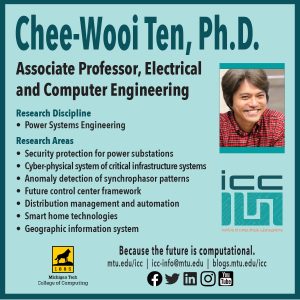
Associate Professor Chee-Wooi Ten, Electrical and Computer Engineering, recently finalized contracts to write two books for CRC Press, a major publisher of humanities, social science, and STEM books and textbooks. Ten is a member of the Institute of Computing and Cybersystems’s Center for Cyber-Physical Systems.
The first book is titled, Electric Power Distribution System Engineering, 4th edition. Ten has been teaching EE5250 Distribution Engineering I at Michigan Tech for 10 years.
The second book, Modern Power System Analysis, 3rd Edition, is used to accompany a senior-level power engineering elective. Both books are tentatively scheduled to be published in January 2022.
The new editions continue the work of the late Professor Turan Gönen, a leading expert and popular professor of electrical engineering at California State University, Sacramento. Gönen devoted his life to the writing of four textbooks. One of them, “Electric Power Distribution System Engineering,” published in 2013, is still taught in college classrooms worldwide. Ten notes that it is one of only a few Distribution Engineering textbooks that remains highly regarded by the international research community.
Book contract negotiations were initiated by Nora Konopka, editorial director of engineering at CRC Press/Taylor & Francis. Konopka worked with Ten on a previous book published by the company.
And although Ten did not personally know Prof. Gönen, he has used Gönen’s books in his courses. Ten says he believes Konopka contacted him because she has confidence that he will do an excellent job in carrying on Gönen ‘s work and legacy.
“As a course instructor, especially when you’ve just started, you explore the textbook and master the materials while teaching,” Ten reflects. “Written and revised throughout his long career, the contents of Gönen’s books are enriched from his decades of experience in pedagogy.”
Konopka’s original proposal was for Ten to write four new editions of books by Prof. Gönen. Ten told her, “I cannot do four books, but I can find two other authors who have the expertise to complete those books.”
So, with collaborators at University of Hong Kong and Virginia Tech, all four books will be completed and published. Two of them written by Ten, one each by his collaborators.
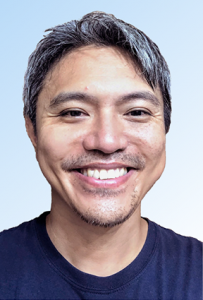
“My colleagues on this project are research-active faculty, and I am very proud to have an opportunity to collaborate with them,” Ten says, noting that they represent two of the best engineering programs in the world.
“These books are collaborative, and we will work together to ensure the next editions of these textbooks reflect today’s industrial and academic knowledge and best practices,” Ten says.
But there are challenges associated with this kind of project. Ten explains that the book materials he has inherited, which are in Microsoft Word, must be converted to the typesetting format he prefers, LaTeX. Only then can he begin editing the books. Fortunately, Ten was able to hire a few students; he expects them to complete the conversions by year-end.
“Then, for the next year, I can focus on qualitative development of the content,” Ten predicts. “I plan to ‘test drive’ some of the new content in the power engineering courses I have been teaching.”
Read an obituary of Prof. Turan Gönen here.
CRC Press. is an imprint of Taylor & Francis Group, part of Informa PLC, one of the world’s leading business intelligence and academic publishing businesses. The company publishes more than 2,700 journals and 5,000 new books each year. CRC Press specializes in Science, Technology and Medical books.
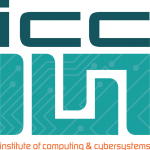
Founded in 2015, the Institute of Computing and Cybersystems (ICC) promotes collaborative, cross-disciplinary research and learning experiences in the areas of computing education, cyber-physical systems, cybersecurity, data sciences, human-centered computing, and scalable architectures and systems, for the benefit of Michigan Technological University and society at large.
The ICC creates and supports an arena in which faculty and students work collaboratively across organizational boundaries in an environment that mirrors contemporary technological innovation. The ICC’s 55+ members working in six research centers represent more than 20 academic disciplines at Michigan Tech. Member scientists are collaborating to conduct impactful research, make valuable contributions in the field of computing, and solve problems of critical national importance.
Full Citations
Turan Gönen, Chee-Wooi Ten**, and Ali Mehrizi-Sani, “Electric Power Distribution System Engineering,” 4th Edition CRC, January 2022 (tentatively).
Turan Gönen, Chee-Wooi Ten**, and Yunhe Hou, “Modern Power System Analysis,” 3rd Edition, CRC, January 2022 (tentatively).
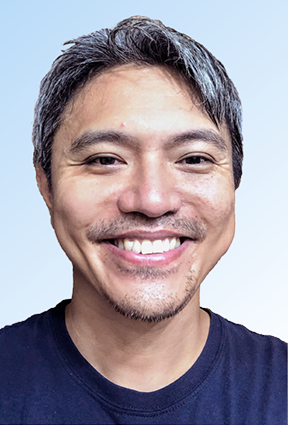
Associate Professor Chee-Wooi Ten, Electrical and Computer Engineering, was cited in the article, “Reports Summarize Engineering Study Results from Electrical & Computer Engineering Department (Premium Calculation for Insurance Businesses Based On Cyber Risks In IP-based Power Substations),” published August 11, 2020 in Advisor News.
Ten is a member of the Institute of Computing and Cybersystems (ICC) at Michigan Tech and the ICC’s Center for Cyber-Physical Systems.
The paper emphasizes a framework of premium calculation for cyber insurance businesses by modeling potential electronic intrusion with steady-state simulation results and its direct hypothesized impacts, according to the article, citing a NewsRx press release.
The article discussed Ten’s National Science Foundation (NSF) Cyber-Physical Systems grant, “CPS: Medium: Collaborative Research: An Actuarial Framework of Cyber Risk Management for Power Grids.” Assistant Professor Yeonwoo Rho, Mathematical Sciences, is co-PI on the award. The three-year $349K project was awarded in August 2017. Read the abstract and view additional CPS and ICC research projects here, . View the award at NSF.com.
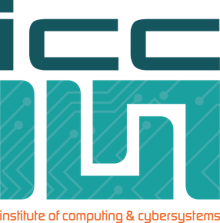
The Institute of Computing and Cybersystems, founded in 2015, promotes collaborative, cross-disciplinary research and learning experiences in the areas of computing education, cyber-physical systems, cybersecurity, data sciences, human-centered computing, and scalable architectures and systems for the benefit of Michigan Technological University and society at large.
It works to provide faculty and students the opportunity to work across organizational boundaries to create an environment that mirrors contemporary technological innovation.
Advisor News is published by InsuranceNewsNet, which describes itself as on the forefront of communicating breaking news and original insights to the industry. With thousands of news sources and hundreds of original articles, the site provides premium content typically only available through proprietary news outlets.
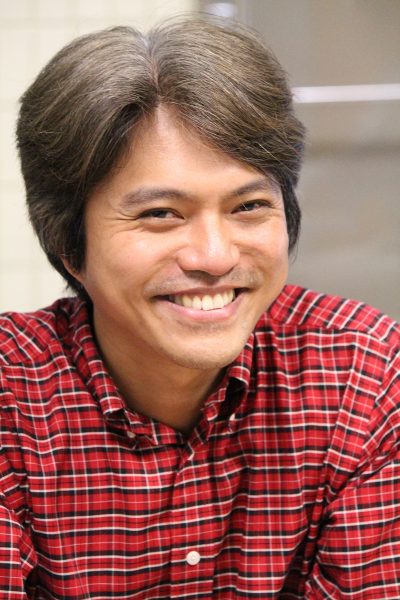
Chee-Wooi Ten, associate professor, Electrical and Computer Engineering, and member of the ICC’s Center for Cyber-Physical Systems, was recently awarded a 6 month, $25K contract from the nonpartisan advisory panel, Protect Our Power. The title of the project is, “Consulting for Utilities on Cyber Risk Management.”
The activities Ten will undertake for the project include identifying security vendors for industrial harden security hardware and software, and conducting a survey of each of the identified security vendors to enumerate their strengths and weaknesses.
Ten will talk with vendors and utilities to understand their needs, identify product niches, and prepare a conclusion report that discusses the pros and cons of each vendor product and how each niche will contribute to general solutions for deploying security solutions for U.S. power utilities.
Project deliverables include a literature review, vendor discovery search, criteria identification and definition, comparative analysis matrix, and best practices conclusion paper.
Protect Our Power is a nonpartisan advisory panel with the single focus of strengthening the nation’s electrical power grid. The panel is composed of experts from industry, the physical and cyber defense communities, and finance and government. Its mission is to build consensus among key stakeholders and public policy influencers to launch a coordinated and adequately funded effort to make the nation’s electric grid and the country’s more than 3,000 utility companies prepared and protected against all cyberthreats.
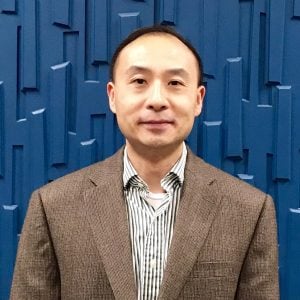
The Institute of Computing and Cybersystems and the Department of Electrical and Computer Engineering will present a lecture by Dr. Kun Zhu on Monday, March 2, 2020, at 3:00 p.m., in EERC 501. The title of Dr. Zhu’s talk is “Power Grid Operations – Beyond Physics.
Dr. Zhu holds a Ph.D. in electrical engineering from Iowa State University. He has 20 years’ experience in the power industry, including 17 years at MISO, an independent, not-for-profit organization that delivers safe, cost-effective electric power across 15 U.S. states and the Canadian province of Manitoba.
Dr. Zhu’s presentation will provide a high level introduction to how regional operators manage the power grid in the U.S. He will discuss how energy markets and balancing authorities (those responsible for maintaining the electricity balance within their respective regions) manage their regions and interact with each other; differences in how energy and transmission assets are managed; and the function of Regional Transmission Organizations (RTO).
At MISO, Dr. Zhu’s experience expands across planning, operations, and tariff administration. Currently, he is the manager of generator interconnection and chair of the SPIDER Working Group (SPIDER), a working unit of North America Electric Reliability Cooperation (NERC).
MISO operates one of the world’s largest energy markets with more than $29 billion in annual gross market energy transactions.
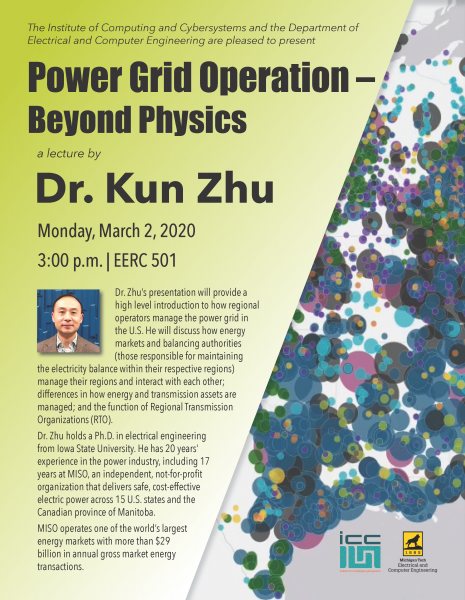
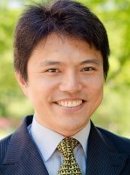
Chee-Wooi Ten (ECE), a member of Michigan Tech’s Center for Agile and Interconnected Microgrids and the ICC’s Center for Cyber-Physical Systems, is the principal investigator on a 17-month project that has received a $99,732 research and development cooperative agreement with the University of California Riverside. The project is entitled, “Discovery of Signatures, Anomalies, and Precursors in Synchrophasor Data with Matrix Profile and Deep Recurrent Neural Networks.”